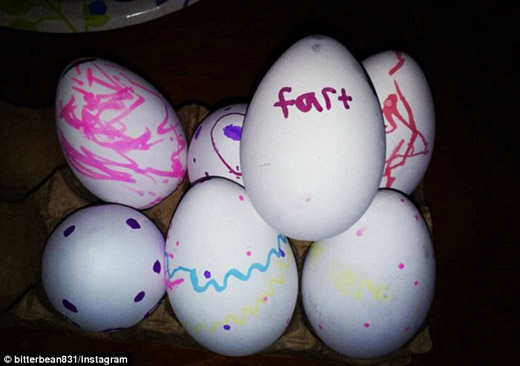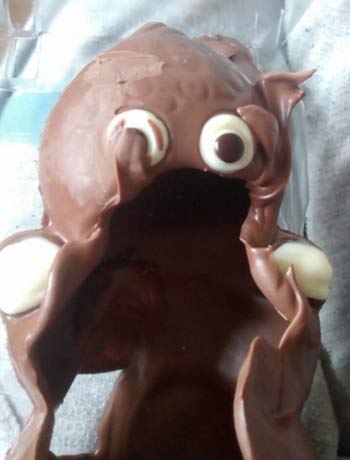當(dāng)前位置: Language Tips> 雙語(yǔ)新聞
Headless bunnies, Easter Egg-induced tantrums...Parents take to social media to share their #EasterFails
分享到

Like Christmas, Easter is one of the times of year when parents eagerly plans surprises for their children.
和圣誕節(jié)一樣,復(fù)活節(jié)是父母熱切地為孩子們制造驚喜的節(jié)日。
Eggs are hidden, treats baked and stories of the Easter Bunny told. But in some cases, not everything goes to plan.
彩蛋藏好了,美味糕點(diǎn)烤好了,復(fù)活節(jié)兔子的故事也講過了。但是,有時(shí)候,事情并不像計(jì)劃的那樣順利。
Some parents have taken to social media to share their 'Easter fails', including many that ended with children crying.
一些父母通過社交媒體分享他們的“復(fù)活節(jié)敗筆”,其中好多“杰作”以嚇哭孩子收?qǐng)觥?/p>
One mother left her children alone to decorate eggs, only to come back and find the word 'fart' written across them.
一位媽媽讓孩子一個(gè)人獨(dú)自裝飾彩蛋,回來(lái)時(shí)卻發(fā)現(xiàn)雞蛋上寫著大大的“屁”字。

Mum Krista Thomsen, from Seattle, shared a photo of the results of her attempt at egg decorating attempt with her son, who had split dye all over the carpet.
來(lái)自西雅圖的媽媽克里斯塔·湯姆森分享了一張她嘗試與兒子一起裝飾彩蛋的照片,照片上她的兒子把染料灑得整個(gè)地毯都是。
Others accidentally left chocolate hidden too long and ended up with melted eggs or bunnies that didn't look to appealing anymore.
還有一些家長(zhǎng)不小心把巧克力藏太久了,結(jié)果巧克力蛋和巧克力兔子都融化了,完全沒有造型可言。

Another parent carefully hid Easter eggs for her child to hunt, only to find the family pet went in search of treats before her daughter could.
還有一個(gè)媽媽很認(rèn)真地藏好了復(fù)活節(jié)彩蛋,準(zhǔn)備讓她的孩子去尋找,但是,還沒等自己的女兒開始找,家里的寵物早已捷足先登。
'The dogs did the Easter egg hunt and went through Charlotte's Easter basket while we were at church. They found every single egg and ate every single piece of candy,' Traci Lafrenz wrote on Instagram.
“當(dāng)我們還在教堂的時(shí)候,狗狗們便開始了復(fù)活節(jié)彩蛋探險(xiǎn)并且‘拆封’了夏洛特的復(fù)活節(jié)籃子。它們找到了所有的巧克力蛋,吃光了每一顆糖果,”特拉茜·拉夫仁茨在Instagram上寫道。
A couple of posts to the #easterfail hashtag on Instagram showed schools and restaurants inadvertently scaring children by displaying what appeared to be decapitated Easter bunny heads.
Instagram上在“復(fù)活節(jié)敗筆”主題標(biāo)簽下的幾個(gè)貼子提到學(xué)校和餐館展示的看上去像被斬首的復(fù)活節(jié)兔子頭在無(wú)意中嚇到了孩子。

Other fails were a little bit ruder. One Instagram user shared a screenshot of a 'walking bunny balloon' that was well endowed in the grown area.
另一些敗筆則更為粗魯。一位Instagram用戶分享了一個(gè)屏幕截圖:一只少兒不宜的“行走的兔子氣球”。
Another shared a photo of an Easter bunny who had put their costume on backwards, resulting in the tail appearing in an inappropriate spot.
另一個(gè)用戶分享了一張照片——一個(gè)人把復(fù)活節(jié)兔子的衣服前后穿反了,導(dǎo)致兔子的尾巴出現(xiàn)在了不該出現(xiàn)的位置。
The hashtag #easterfail has more than 2,000 posts on Instagram.
在Instagram上,“復(fù)活節(jié)敗筆”話題標(biāo)簽下已有2000多條貼子。
***文化小貼士***
復(fù)活節(jié)的時(shí)間?
每年春分月圓之后第一個(gè)星期日。
復(fù)活節(jié)的起源和寓意?
復(fù)活節(jié)象征著重生與希望,為紀(jì)念耶穌基督于公元30到33年之間被釘死在十字架之后第三天復(fù)活的日子。
如何慶祝復(fù)活節(jié)?
復(fù)活節(jié)前夕,孩子們會(huì)和家人一起給雞蛋著色打扮一番。這些蛋有的煮得很老,有的只是空空的蛋殼。復(fù)活節(jié)那天早上,孩子們會(huì)發(fā)現(xiàn)床前的復(fù)活節(jié)籃子里裝滿了巧克力彩蛋、復(fù)活節(jié)小兔子、有絨毛的小雞及娃娃玩具等。人們也常常繪聲繪色地給孩子們講復(fù)活節(jié)彩蛋是兔子下的,并把彩蛋放在花園里,讓孩子們玩找蛋游戲。在歐美國(guó)家還會(huì)舉行滾彩蛋的傳統(tǒng)活動(dòng)。
現(xiàn)在每逢復(fù)活節(jié),美國(guó)大小糖果店總要出售用巧克力制成的復(fù)活節(jié)小兔和彩蛋。這些彩蛋小的和雞蛋差不多,大的有甜瓜那么大,孩子們吃起來(lái)津津有味。復(fù)活節(jié)的傳統(tǒng)食品是肉食,主要有羊肉和火腿。
復(fù)活節(jié)彩蛋怎么來(lái)的?
十二世紀(jì)時(shí),人們?cè)趶?fù)活節(jié)節(jié)慶中加入雞蛋,此蛋多涂以紅色,也有繪成彩色和笑臉。故一般稱之為“復(fù)活節(jié)彩蛋”。蛋的原始象征意義為“春天——新生命的開始”。基督徒則用來(lái)象征“耶穌復(fù)活,走出石墓”。復(fù)活節(jié)彩蛋是復(fù)活節(jié)里最重要的食物象征,意味著生命的開始與延續(xù)。
現(xiàn)代生活中的復(fù)活蛋通常使用蛋狀的巧克力代替,不再是單純的裝飾品,而是一種在復(fù)活節(jié)前后最暢銷的食品。
復(fù)活節(jié)為什么有兔子?
復(fù)活兔起源于異教的復(fù)活節(jié)。當(dāng)時(shí),耶穌的世俗象征是一個(gè)兔子,并被盎格魯撒克遜人供奉著。作為多產(chǎn)動(dòng)物的兔子,復(fù)活節(jié)兔象征了春天的復(fù)蘇和新生命的誕生。在現(xiàn)代兔子被認(rèn)為是給孩子們送復(fù)活節(jié)彩蛋的使者。據(jù)說(shuō)復(fù)活節(jié)兔子會(huì)將彩蛋藏在室內(nèi)或是草地里讓孩子們?nèi)ふ摇?/p>
英文來(lái)源:每日郵報(bào)
譯者:孫偉
審校&編輯:丹妮
上一篇 : 研究:新車“香味”有毒!
下一篇 : 馬拉松賽事香皂當(dāng)甜點(diǎn)
分享到
關(guān)注和訂閱


口語(yǔ)
關(guān)于我們 | 聯(lián)系方式 | 招聘信息
電話:8610-84883645
傳真:8610-84883500
Email: languagetips@chinadaily.com.cn